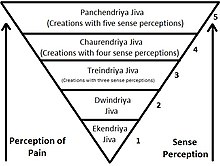
Back نظام نباتي جايني Arabic জৈন নিরামিষবাদ Bengali/Bangla Vegetarianismo jaina Spanish Végétarisme jaïn French जैन भोजन Hindi जैन (सात्विक) भोजन MAI ജൈന സസ്യാഹാര രീതി Malayalam ลัทธิมังสวิรัติแบบเชน Thai 耆那教素食主義 Chinese

| Part of a series on |
| Jainism |
|---|
 |
| This article is part of the series on |
| Indian cuisine |
|---|
 |
Jain vegetarianism is practised by the followers of Jain culture and philosophy. It is one of the most rigorous forms of spiritually motivated diet on the Indian subcontinent and beyond. The Jain cuisine is completely lacto-vegetarian and excludes root and underground vegetables such as potato, garlic, onion, cauliflower, eggplant, mushroom, etc., to prevent injuring small insects and microorganisms. The diet also helps prevent the entire plant from being uprooted and killed. It is practiced by Jain ascetics and lay Jains.[1]
The objections to the eating of meat, fish and eggs are based on the principle of non-violence (ahimsa, figuratively "non-injuring"). Every act by which a person directly or indirectly supports killing or injury is seen as act of violence (himsa), which creates harmful reaction karma. The aim of ahimsa is to prevent the accumulation of such karma.[2][3] The extent to which this intention is put into effect varies greatly among Hindus, Buddhists and Jains. Jains believe nonviolence is the most essential religious duty for everyone (ahinsā paramo dharmaḥ, a statement often inscribed on Jain temples).[4][5][6] It is an indispensable condition for liberation from the cycle of reincarnation,[7] which is the ultimate goal of all Jain activities. Jains share this goal with Hindus and Buddhists, but their approach is particularly rigorous and comprehensive. Their scrupulous and thorough way of applying nonviolence to everyday activities, and especially to food, shapes their entire lives and is the most significant hallmark of Jain identity.[8][9][10][11] A side effect of this strict discipline is the exercise of asceticism, which is strongly encouraged in Jainism for lay people as well as for monks and nuns.[12][13][14] Out of the five types of living beings, a householder is forbidden to kill, or destroy, intentionally, all except the lowest (the one sensed, such as vegetables, herbs, cereals, etc., which are endowed with only the sense of touch).[15]
- ^ Natubhai Shah 2004, p. 249.
- ^ Laidlaw 1995, pp. 26–30.
- ^ Laidlaw 1995, pp. 191–195.
- ^ Dundas 2002, p. 160.
- ^ Wiley 2006, p. 438.
- ^ Laidlaw 1995, pp. 153–154.
- ^ Hemacandra, Yogashastra 2.31.
- ^ Laidlaw 1995, pp. 154–160.
- ^ Jindal 1988, p. 74–90.
- ^ Tähtinen 1976, p. 110.
- ^ Dundas 2002, pp. 176–177.
- ^ Dundas 2002, pp. 187–192.
- ^ Dundas 2002, pp. 199–200.
- ^ Laidlaw 1995, pp. 153–159.
- ^ Champat Rai Jain 1917, p. 79.